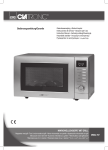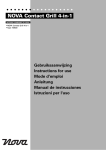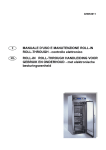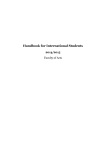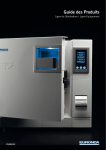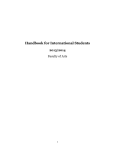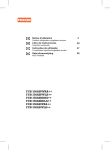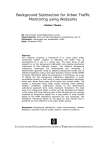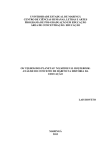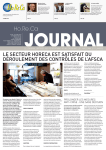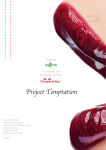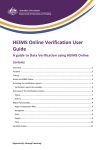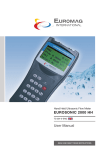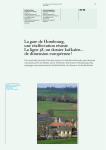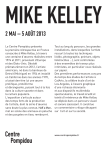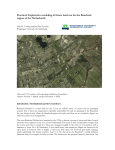Download Handbook - Rijksuniversiteit Groningen
Transcript
Handbook for International Students 2015/2016 Faculty of Arts 1 Contents 1. 2. 3. 4. 5. Welcome to the Faculty of Arts..................................................................... 4 1.1 Words of Welcome by the Dean of the Faculty of Arts ................................................. 4 1.2 About this Handbook ..................................................................................................... 5 The Faculty of Arts ....................................................................................... 6 2.1 Departments and secretarial offices .............................................................................. 7 2.2 Organisation: how the faculty is managed .................................................................... 7 2.3 Locations and addresses ................................................................................................8 2.4 Lecture and seminar rooms ........................................................................................... 9 2.5 Other faculties .............................................................................................................. 10 Student services .......................................................................................... 12 3.1 Cafeteria........................................................................................................................ 12 3.2 Computer facilities ....................................................................................................... 12 3.3 ESN Erasmus Student Network .................................................................................. 12 3.4 ISD International Service Desk ................................................................................... 12 3.5 Library .......................................................................................................................... 13 3.6 The Language Centre ................................................................................................... 13 3.7 Klapperwinkel (Shop for readers) ............................................................................... 14 3.8 Repro shop (University copy shop) ............................................................................. 14 3.9 SSH Student housing ................................................................................................... 14 3.10 Student police officer ................................................................................................... 15 3.11 Studium Generale ........................................................................................................ 15 3.12 University Shop ............................................................................................................ 15 3.13 USD University Student Desk...................................................................................... 15 Courses .......................................................................................................16 4.1 Course catalogue: Ocasys ............................................................................................. 16 4.2 Timetables .................................................................................................................... 16 4.3 Registration for courses: ProgessWWW and Nestor .................................................. 16 4.3.1 Enrolling for courses/modules: exchange students ............................................ 17 4.3.2 Enrolling for courses/modules: degree students ................................................ 17 4.3.3 Enrolling for seminar groups: Nestor .................................................................. 18 4.4 Exams ........................................................................................................................... 18 4.5 Grades ........................................................................................................................... 19 Student support ......................................................................................... 20 5.1 Study advisers degree students .................................................................................. 20 5.2 Study adviser exchange students ................................................................................ 20 5.3 Office for Student Affairs ............................................................................................ 20 5.4 Study support (SSC)/Psychological counselling ........................................................ 20 5.5 Specials needs............................................................................................................... 21 2 6. 7. 8. Practical Matters ........................................................................................ 22 6.1 Student card .................................................................................................................22 6.2 Transcript of records for degree students ...................................................................22 6.3 Transcript of records for exchange students ...............................................................22 6.4 Graduation (degree students only) ..............................................................................22 Do’s & don’ts in the classroom ................................................................... 23 7.1 Class attendance ...........................................................................................................23 7.2 Fraud or plagiarism......................................................................................................23 7.3 The lecturer and fellow Dutch students ......................................................................24 Funny Facts................................................................................................ 25 8.1 Coming to Groningen ................................................................................................... 25 8.2 Funny Facts .................................................................................................................. 25 8.3 Tips for trips ................................................................................................................. 25 8.4 German Cities ............................................................................................................... 27 8.5 The Dutch Wadden Islands ......................................................................................... 27 8.6 Some other tips of things you can visit in The Netherlands: ..................................... 28 8.7 Some Dutch expressions and sentences you should know ....................................... 28 8.8 Dutch food and drinks .................................................................................................29 Annex ............................................................................................................... 30 City map Groningen ............................................................................................................... 30 Map Zerninke complex ........................................................................................................... 31 Academic Calendar ..................................................................................................................32 3 1. Welcome to the Faculty of Arts 1.1 Words of Welcome by the Dean of the Faculty of Arts The Faculty of Arts of the University of Groningen attaches great importance to having students from outside the Netherlands in its programmes of study. International students raise cultural awareness in higher education. This is a highly desirable goal. Generally, students - like all people - take their own cultural frame of mind for granted. To lose their cultural innocence, students (and teachers as well) have to learn to look at the world through the eyes of persons from different cultural backgrounds. The interaction with foreign students creates favourable conditions for this learning process. Therefore, the Faculty strongly appreciates the active participation of international students, both inside and outside the class room. We hope you will have a fruitful, inspiring and enjoyable stay in Groningen! Gerry C. Wakker, Dean of the Faculty of Arts 4 1.2 About this Handbook In this handbook you will find specific information about studying at the Faculty of Arts of the University of Groningen. It contains information for exchange students and degree students. Not all the information applies to both types of students. Degree students have come to the Faculty of Arts to obtain a BA or MA degree in Groningen. For this, they have gone through an admission procedure. Exchange students are in Groningen for one or two semesters and will obtain their degree at their home university. General information for international students about living in Groningen and studying at the University can be found in the digital brochure Welcome to the University of Groningen 20152016. In the Health Guide for International Students you can find up-to-date and very useful information about health issues. We hope this handbook will help you find your way around our faculty, and we wish you an enjoyable and memorable time in Groningen! The staff of the Mobility Office: Margo Slebus Gerda Poortman Sigrid Hasper Maaike Moltzer Janet Caspers Joyce Snijder-Gelling Admissions officers: Anja de Vries Jelmer van der Hem (left to right: Jelmer van der Hem, Janet Caspers, Maaike Moltzer, Joyce Snijder-Gelling, Anja de Vries, Margo Slebus) 5 2. The Faculty of Arts The Faculty of Arts is a large, dynamic faculty in the heart of the city of Groningen. It has more than 5000 students and 700 staff members, who are working at the frontiers of knowledge every day. The Faculty offers a wide range of degree programmes: 15 Bachelor's programmes and over 35 Master's specializations. Our research, which is internationally widely acclaimed, covers the following fields: Archaeology, Cultural Studies, History, International Relations, Journalism, Language and Literary Studies, and Linguistics. The Mobility Office The Mobility Office of the Faculty of Arts caters to outgoing exchange students, incoming exchange students, degree students arranging an internship and international degree students. If you have questions about your exchange, courses, registration at the university, visa, internships, or any other matters, you can contact the Mobility Office. If we are not the correct desk to answer your question, at least we will be able to point you in the right direction. The information desk of the Mobility Office of the Faculty of Arts is located on the first floor of the Harmonie Building, in the corridor to the right of the large red students’ desk in the hall. Office hours: Monday to Friday, from 1 – 4 p.m. Website: www.rug.nl/let/mobilityoffice Gerda Poortman behind the students’ desk Exchange students For all practical questions exchange students can contact Joyce Snijder-Gelling, coordinator for incoming exchange students. E-mail address: [email protected] +31 (0)50 363 4420 6 Study adviser for exchange students For questions about courses and academic matters, and in case of serious personal problems that affect your studies, you may contact the study adviser for exchange students, Maaike Moltzer. Her office is next to the Mobility Office (Harmonie Building, 1311.0104). E-mail: [email protected] +31 (0)50 363 2909 Office hours: Tuesday 1-3 p.m., Wednesday 1-3 p.m., Friday 1-3 p.m., or by appointment Degree students If you have come to Groningen to study for a degree, please contact your new department (the secretariat or the coordinator of your degree programme) in case you have questions or problems. If you have problems with your university registration, you can contact the Admissions Office: [email protected]. 2.1 Departments and secretarial offices Departments Archaeology Art History Arts, Culture and Media Research Masters History International Relations and International Organization Classics MA Euroculture MA Humanitarian Action (NOHA) American Studies European Languages and Cultures English Language and Culture Languages and Cultures of the Middle East Dutch Language and Culture Communication and Information Sciences Frisian Language and Culture Journalism Office for student affairs (for degree students) 2.2 address secretarial office Poststraat 6 Oude Boteringestraat 34 Harmonie Building, 5th floor Room 1311.0511 Harmonie Building, 2nd 1315.0224 Harmonie Building, 2nd 1315.0213 Harmonie Building, 2nd floor room 1315.0263 floor, floor, Harmonie Building, 4th floor room 1312.0407 Harmonie Building, 1st floor Organisation: how the faculty is managed Faculty Board The Faculty Board is in charge of overall management and administration of the Faculty and consists of the Dean, two members and, in an advisery capacity, a student member. Faculty Council The Faculty Council advises the Board in matters concerning teaching, learning and research as well as the Faculty budget. In some cases, such as decisions about teaching, the approval of the Faculty Council is required. 7 Institute for Undergraduate and Graduate Studies The Institute for Undergraduate and Graduate Studies, headed by a Director, manages and organises all BA and MA degree programmes in the Faculty. Support services, such as the Office of Student Affairs and the Mobility Office are part of the Institute, as well as study advisers. Research schools Research is organised in so-called “research schools” that have their own research programmes and are responsible for the PhD training of students. In many cases, research schools involve several faculties. The Faculty of Arts participates in seven research schools. Graduate School of Humanities The Faculty of Arts of the University of Groningen provides advanced training and research supervision in Research Masters and on PhD level to the most promising students in Archaeology, Literature and Culture Studies, and Linguistics. Several research institutes participate in the Graduate School. Departmental Committees A Departmental Committee is responsible for the practical implementation of a degree programme. Curriculum Committees The Curriculum Committees are important advisery bodies for the degree programmes. They are also in charge of the evaluation of degree programmes. Half of the members of the Curriculum Committee are students and half are staff. Admission Boards Every degree programme has its own admission board, that decides upon admission of new students. Examination Boards Every degree programme has its own Examination Board, consisting of all the lecturers involved in that programme. The Board of Examiners ensures that the Teaching and Examination Regulations are implemented correctly. Among other things, it issues degree certificates and deals with complaints by students concerning examinations, cases of fraud and cheating, and admission to courses or exams. 2.3 Locations and addresses Map You can find a small map of the city of Groningen and the Zernike area on the final pages of this handbook, so you can find out where everything is. If you want a bigger map, in full colour, you can buy one for € 1 at the University shop, opposite the Harmonie Building in the Oude Kijk in ‘t Jatstraat, no. 39. General locations and addresses faculty of arts The Faculty of Arts is housed at a number of locations in the city centre. Most of the departments and all the facilities, such as the Mobility Office, can be found at the central address, as well as most of the departments. Classes often take place there as well, but also at one of the other locations or the Academy Building (the central university building). 8 Visiting address: Oude Kijk in ’t Jatstraat 26 9712 EK Groningen, The Netherlands Postal address: University of Groningen Faculty of Arts PO Box 716 9700 AS Groningen, The Netherlands +31 (0)50 363 5900 (faculty office) +31 (0)50 363 5901 (porters’ desk) Opening hours during semesters: Monday to Thursday 8.00 am – 10.00 pm Friday 8.00 am – 6.00 pm Faculty of Arts, Harmonie Building 2.4 Lecture and seminar rooms Harmonie Building, Oude Kijk in ’t Jatstraat 26 The Harmonie Building has 5 wings (parts of the building) which have been numbered from 1311 to 1315. The number of the room comes after the wing number. This is how you can find the main lecture and seminar rooms in the Harmonie Building: Building part 11 Building part 12 (beginning with 1312) Building part 13 (beginning with 1313) Building part 14 (beginning with 1314) Building part 15 (beginning with 1315) ‘Aquarium’ Ground floor: cafeteria First floor: cafeteria and Mobility Office Ground floor, in the corridor to the right: lecture and seminar rooms 1312.0006, 1312.0007, 1312.0012, 1312.0013, 1312.0018, 1312.0019, 1312.0024, 1312.0025, 1312.0030 On the ground floor (follow the green line), take the corridor to the right, at the end turn right and right again, and take the stairs or elevator to the first floor: Law Library, study facilities Second floor: seminar rooms 1313.0309, 1313.0316, 1313.0338, 1313.0340, 1313.0342, 1313.0344; Under the arches, in the old part of the building: lecture halls 1314.0014 and 1314.0026. On the ground floor, take the smaller exit and cross the bicycle area. Seminar rooms 1315.0031, 115.0036, 1315.0037, 1315.0042, 1315.0043, 1315.0048, 1315.0055. There are smaller seminar rooms elsewhere in the building. You can locate them easily once you know which part of the building they are in. Otherwise ask at the porters’ desk on the ground floor, or follow the corresponding coloured lines on the floor. Academy Building, Broerstraat 5 This is the central university building with the stairs in front, opposite the University Library. It is very close to the Harmonie Building, on the other side of the Oude Kijk in ’t Jatstraat. Follow the signposts in the building. Lecture halls and seminar rooms: - A2, A3, A7, A8, A12 9 - Zernikezaal (Zernike Hall; not to be confused with the Zernike University Area to the north of the city centre). Abbreviation: AZern - Offerhauszaal (AOffh) - Van der Leeuwzaal (ALeeuw) - Heymanszaal (AHeym) - Geertsemazaal (AGrts) +31 (0)50 363 5250 (porters’ desk) Opening hours: Monday to Thursday 8.00 am – 10.00 pm Friday 8.00 am – 8.00 pm Broerstraat 9 This annex is next to the Academy Building; lecture rooms A900 and A901. Oude Boteringestraat 23 / OBS 23 The Oude Boteringestraat is the street parallel to the Oude Kijk in’t Jatstraat, where the Harmonie Building is, at the other end of the Broerstraat. +31 (0)50 363 7270 Oude Boteringestraat 32-34 / OBS 34 +31 (0)50 363 7533 Poststraat 6 +31 (0)50 363 6707 A-weg 30 This is about one kilometer away from the Harmonie Building. Starting from the Harmonie Building on the Oude Kijk in’t Jatstraat, turn right until you reach the Vismarkt. Then turn right again and keep going. The street name changes to Brugstraat, A-Kerkhof and, across the bridge to A-straat and finally A-weg. A-weg 30 is on your right. +31 (0)50 363 5920 Turftorenstraat This building is part of the Faculty of Law, but Arts courses can take place there as well. The building is next to the cafeteria of the Harmonie Building.You can enter it from the Uurwerkersgang by following the blue line on the ground from the Harmonie Building main hall. In your timetable, seminar rooms at the Turftorenstraat are preceded by ‘Turft’ followed by the room number. 2.5 Other faculties Faculty of Law Turftorenstraat 21, 9712 BE Groningen, International Office: room T-68. Opening hours: Monday, Tuesday, Thursday 1.30-3 p.m. [email protected] Faculty of Behavioural and Social Sciences Grote Kruisstraat 2, 9712 TS Groningen Opening hours International Office: Monday to Friday, 9.30-11.30 a.m. [email protected] 10 Faculty of Philosophy Oude Boteringestraat 52, 9712 GL Groningen The study adviser Harry ten Have ([email protected]) Faculty of Theology and Religious Studies Oude Boteringestraat 38, 9712 GK Groningen [email protected] The following faculties are located in the Zernike University Area, which is about 3.5 kilometres from the Harmonie Building, to the north of the city centre. You need a bike, or you can take Citybus 15 to Zernike. Faculty of Economics and Business FEB Exchange Office is part of the Student Support Department. Duisenberg Building Plaza, Student Support Desk, Zernike Campus, Groningen. [email protected] Faculty of Spatial Sciences Landleven 1, 9747 AD Groningen Room 0.19 (P.J.M. van Steen), [email protected] Faculty of Mathematics and Natural Sciences Bernouilliborg Building Neijenborg 9, Groningen [email protected] NHL Campus Leeuwarden Courses that are part of the MA programme Multilingualism are taught at the campus of the Noordelijke Hogeschool Leeuwarden (Van Hall Larenstein University of Applied Sciences), about 60 km away. Leeuwarden, the capital of the province of Friesland, can be reached easily from Groningen by train and bus. For more information on how to get there, see www.9292.nl, the door-to-door public transport journey planner. The address of the Leeuwarden campus is Rengerslaan 10, 8917 DD Leeuwarden. 11 3. Student services 3.1 Cafeteria In the Cafeteria on the ground floor of the Harmonie Building you can get sandwiches, soup, drinks, and candy. On the first floor you will find the C-bar for a good cup of coffee, tea and assorted cakes. 3.2 Computer facilities All students receive a computer account which gives them access to computers that are installed in the study areas at the Faculty of Arts and other University Buildings and to the university network. Computer accounts for international students are free of charge. You will also be given a student email account. It is important to check this account frequently, as all university mail will be directed to your official student account! This includes information from the Mobility Office about exams and registration! To find all student facilities: log on to My University, on www.rug.nl IT Helpdesk for students: Harmonie Building, room 1313.0231 (follow the green line, go to the first floor, and take a left to the study areas. The desk is located to the right). Further down the corridor you can find the multi media rooms. E-Mail: [email protected] : +31 (0)50 363 3232 Opening hours: Monday – Friday: 8.30 a.m. – 5 p.m. 3.3 ESN Erasmus Student Network Erasmus Student Network (ESN) is one of the biggest interdisciplinary student organizations in Europe, founded in 1989 for supporting and developing student exchange. The main focus of ESN is placed on all international and exchange students in Groningen. ESN offers help and support in academic, social and practical integration processes. The latter is mainly done through the organization of a wide range of activities, including cultural events (international dinners, country nights, excursions to various places in and outside the Netherlands), social events (Monday night social, theme parties), educative programs (language exchange, career events) and charitable events. Check out the website www.esn-groningen.nl or the ESN Facebook page to read more about all activities ESN organizes and to see what's coming up. Additionally, ESN provides internationals with a mentor system linking international students to a mentor. These mentors help the international students when they arrive in Groningen and provide support for academic and practical integration. 3.4 ISD International Service Desk For general information for international students, and visa and immigration procedures in particular. Visiting address: Academy Building, Broerstraat 5, first floor +31 (0)50 363 8181 www.rug.nl/isd E-mail: [email protected] Opening hours: Monday to Friday, 2 – 4 p.m. 12 3.5 Library The University of Groningen Library has around three million books and periodicals. You can find out where books, documents and journals are via the Library Portal www.rug.nl/science-andsociety/library/ . In order to borrow books, you need your student card. You can order books online via the University catalogue. Use the number on your student card under the barcode and the first three letters of your family name to log in. The library sends an email to your student e-mail account to remind you to bring back your books or to renew the loan. If you enter the catalogue of the library and click on 'borrower information' you can see which books are in your possession. Visiting address University Library: Broerstraat 4 (opposite the Academy Building) Information desk: +31 (0)50 363 5020 Opening hours: Mondays – Fridays: 8.30 a.m. – midnight Saturdays and Sundays: 10 a.m. – 10 p.m. During vacations, holidays and exam time opening hours may change. Check the website for current opening hours, or download the University of Groningen Library App for the Library opening hours and availability of computers. The app is available for iOS and Android. 3.6 The Language Centre The Language Centre of the University of Groningen offers elementary and advanced courses in several languages. Of particular interest to international students are the Dutch courses, which are taught at different levels. You have to pay a fee for language courses taught by the Language Centre of around € 300. Exchange students: you can add a Dutch language course to your learning agreement and gain 5 ECTS for it. If you are an exchange student of the Faculty of Arts part of this fee may be refunded under certain conditions. More information is available from the Dutch Studies administrator ([email protected]). The Language Centre also offers courses at various levels in English, French, Italian, Japanese, Chinese, German, Spanish and Portuguese. For these courses you usually won’t get ECTS credits, but you will receive a certificate of attendance at the end. Exchange students: some home universities will award you ECTS credits for a language course, check this with your home Erasmus coordinator. It is also possible to have your level of English proficiency tested in terms of the internationally recognized Common European Framework of Reference for Languages (CEFR). The Language Centre is located on the first floor of the Harmony building (room 15.129) : +31 (0)50 363 5802 : +31 (0)50 363 5886 E-mail: [email protected] Internet: http://www.rug.nl/science-and-society/language-centre/ Opening hours secretarial office: Mondays – Fridays: 12 noon – 4 p.m. Thursdays: 12 noon – 8 p.m. 13 3.7 Klapperwinkel (Shop for readers) At the ‘klapperwinkel’ you can pick up readers which you need in some of your classes. Check this in the course descriptions. Make sure you buy your readers at the beginning of the semester as you need them to prepare for classes! The only way to obtain readers is by ordering them through the web shop and picking them up at the Klapperwinkel after six working days. You have to pay in advance, using credit card or OGONE / iDeal. Before ordering, you need to register at the web shop first, preferably using your Groningen student mail address. If that is not yet available, use your own e-mail address and change it to your student mail address as soon as possible. This is the link to the user manual for ordering readers: http://myuniversity.rug.nl/infonet/studenten/ict/uwprinterstudenten/ (you will be directed to My University, so you have to log in with your student account) The Klapperwinkel can be found on the ground floor of the Harmonie Building in the corridor to the left of the porters’ desk. Opening hours: Tuesday, Wednesday and Thursday 9.30 a.m. – 1.00 p.m. Website (for registering and ordering): http://myuniversity.rug.nl/infonet/studenten/let/ict/repro/ 3.8 Repro shop (University copy shop) At the Repro Shop you can make photocopies and use the printers. Students can make photocopies using the machines on the ground floor of the Harmonie Building and at the Multi Media rooms. You cannot use the other photocopiers in the building! The Repro Shop is located on the ground floor of the Harmonie Building in the corridor on the right, first door on the left. Opening hours: Mondays – Fridays 8.30 a.m. – 4.30 p.m. For printing you use your University card. You can top up the credit via internet. Steps: 1. First, top up your print credit; you can pay via MiniTix, iDeal, PayPal, VISA or Mastercard. 2. Send your print request via Follow You and go to any printer or multifunctional. 3. Log in at the machine by passing your University card over the reader. You can then print your document, or start a scan or photocopy session. N.B. Forgot your University card? Don’t panic, you can also log in with your S number and password. Further instructions on topping up credit via MyOrder or RUG webdeposit can be found here: http://myuniversity.rug.nl/infonet/studenten/ict/uwprinterstudenten/printing-with-universitycard-credit For printing and photocopying, you can also go to CopyCopy, Oude Kijk in’t Jatstraat 52. 3.9 SSH Student housing SSH offers reserved student housing for international students of the University of Groningen during fixed rental periods: Semester I: 24 August until 31 January Semester II: 1 February until 30 June Semester I+II: 24 August until 30 June For any question regarding your SSH application or rental agreement, you can contact the Mobility Office (exchange students) or the Admission Office (degree students). 14 3.10 Student police officer The Groningen Police force has a special police officer for university students. If, for example, your laptop has been stolen or you have questions about security in your neighbourhood, you may contact this officer. His name is Matthijs Beukema. +31 (0)900 - 8844 E-mail 1: [email protected] E-mail 2: [email protected] Website: https://www.facebook.com/studentagent#!/studentagent Twitter: @studentagent 3.11 Studium Generale Studium Generale organises interesting and challenging lectures and debates about science, culture and society for a wide audience. The activities are described as an antidote to overspecialization and are meant to supplement the regular curricula at both the Hanzehogeschool Groningen and the Rijksuniversiteit Groningen (though you get no ECTS/credits for following lectures!). You can usually find posters and flyers about their programme in the entrance hall of the Harmonie Building. Visiting address: Oude Boteringstraat 13. (+31 (0)50 363 5463 E-mail: [email protected] Website: www.sggroningen.nl 3.12 University Shop If you want to buy university souvenirs for your friends at home or get your own RUG hooded sweater, you can go to the University shop. You can also order and see all products online. Visiting address: Oude Kijk in’t Jatstraat 39 Opening hours: Monday: 1 – 5 p.m. Tuesday to Friday: 10 a.m. – 6 p.m. Saturday: 1 – 5 p.m. Website: www.rug.nl/shop 3.13 USD University Student Desk At this information desk you can get general information about studying at the University of Groningen, including administrative and financial matters (for degree students). Visiting address: Academy Building, Broerstraat 5, first floor E-mail: http://www.rug.nl/education/usd/ Opening hours: Monday to Friday, 1 – 4 p.m. 15 4. Courses 4.1 Course catalogue: Ocasys All courses offered by the Faculty of Arts can be found in the online course catalogue Ocasys. The catalogue is available in English and Dutch www.rug.nl/ocasys Beware, however. Although the catalogue is available in English, please look at the language of instruction and the entry requirements. Apart from the language of instruction, courses may also not be available to you because of entry requirements. Therefore, all courses have to be approved by the study adviser for exchange students, or, for degree students, by your own study adviser. 4.2 Timetables The timetables of the courses offered by the Faculty of Arts are available online. This information is partly available in English. If you click on the link in the timetable, you will be redirected to Ocasys. There you will find detailed information about the courses. Conversely, the course description in Ocasys will contain a link to the timetable. Location: rooster.rug.nl Timetables for exams will become available on rooster.rug.nl after the start of the semester. All students are expected to take their exams at the designated dates and times. Exceptions can be made only under very exceptional circumstances. 4.3 Registration for courses: ProgessWWW and Nestor Progress WWW is the official internet application for enrollment for courses and exams and for the registration of study results. You find ProgressWWW by going to https://progresswww.nl/rug/, or by logging in to My University. You use your student number and password to log in to ProgressWWW. More information about ProgressWWW can be found on http://myuniversity.rug.nl/infonet/studenten/let/organisatie/bsz/nieuwe_studenten/?lang=en ProgressWWW login 16 Nestor (https://nestor.rug.nl/) is the online learning environment or Blackboard of the University of Groningen. It is used to provide announcements for courses you are attending, but also for seminar registration, and often teachers will post grades there as well. Do keep in mind that ProgressWWW is the only official grade registration website. If your grades are not in ProgressWWW, then they have not been registered yet. Nestor login 4.3.1 Enrolling for courses/modules: exchange students For exchange students the international office will take care of course registration in ProgressWWW after your course selection has been approved by the study adviser for exchange students. Changes can be made until two weeks after the start of the semester. If you take courses in other faculties, you are sometimes required to go there in person to get registered. You will be informed of this. 4.3.2 Enrolling for courses/modules: degree students Degree students have to register themselves. Course registration takes place in particular weeks which can be found in the academic calendar at the back of this guide and the guide of your degree programme. This is how you register for modules in ProgressWWW: • If necessary, click ‘Switch to English Language’ • Log in with your student number and password • Click ‘enrolling’ at the top • Select ‘Faculty of Arts’ on the left • Select ‘Enrolling for Modules Semester 1’or ‘Semester 2’ • Click on the right phase: bachelor or master • Click on the right department • Choose the right year of study and semester: now a list of available courses appears • Check the box of the courses you want to take and click on ‘enrol’. To de-register for a course, you check the box of a module in your course overview on the right side of the screen and click ‘deregister’. Your enrolment/deregistration will be confirmed by e-mail to your student e-mail account. 17 4.3.3 Enrolling for seminar groups: Nestor Some courses will have more than one seminar group. You have to be enrolled in only one of those seminar groups. For most courses you can enroll yourself in Nestor. During the Final Course Registration office hours, organized by the Mobility Office in week before the start of the semester, we can assist exchange students with their seminar group registration. Degree students can contact the secretariat of their department about their seminar group registration. 4.4 Exams Enrollment for course= enrollment for exam (so you do not have to enroll for exams of the Faculty of Arts separately). The exam periods for the Faculty of Arts for 2015-2016 are: Exam period Sem 1 Exams block 1 19 October – 6 November 2015 Resits block 1 11 January – 15 January 2016 Exams block 2 18 January – 29 January 2016 Sem 2 Resits block 2 21 March – 25 March 2016 Exams block 3 28 March – 8 April 2016 Resits block 3 30 May – 3 June 2016 Exams block 4 6 June – 17 June 2016 Resits block 4 27 June – 1 July 2016 NB: Exam periods vary per faculty! Make sure to be informed about the proper dates (you can ask the international office of the concerning faculty). When you register for a course, you will automatically be registered for the exam. Sometimes exchange students cannot be in Groningen during the exam period in January because the semester at their home university has started. In that case, an exception can be made. If you know you won’t be able to be here in January, inform the Mobility Office or study adviser for exchange students as early as possible. Please bear in mind that (early) holidays are never a ground for exception. Valid grounds for exceptions also include health reasons or serious personal or family circumstances. You need documentation (such as a doctor’s note) to prove this. Inform your study adviser as well. If you are ill during an exam or resit, or cannot be present for urgent reasons, please inform your student adviser as soon as possible so that he/she can contact the exam board for an extra exam opportunity. For formal requests like these, it is necessary to submit documentation stating the reasons why you couldn't attend the exam (for example a doctor's note). Again: early flights or holidays are never a valid reason to miss an exam. If a course is assessed by way of an essay or paper, there is usually no problem, as you can send the paper from home. If necessary you can ask the lecturer for an extended deadline (but it is not guaranteed that you’ll get this!). Dutch Studies exams are earlier than regular courses: early to mid-December and May. 18 4.5 Grades The Dutch grading scale runs from 10 (highest mark) to 1 (lowest mark). The grade 5,5 is the pass grade. Depending on what you are used to at home, you may find that Dutch lecturers give low grades. For most students and lecturers, an 8 is considered very good indeed, while a 9, let alone a 10 are very rarely given. Most students are awarded a 6 or a 7. If you are used to getting higher grades at home, you (and your supervisor at home) may feel disappointed. Remember, however, that this may be due to the modest Dutch grading practice, not necessarily to a poor performance on your part. The ECTS grading table will help you interpret your results by showing the statistical distribution of grades. This will make it easier for your supervisor at home to transfer the Dutch grade to an equivalent used in your home university. ECTS grading tables 2014-2015 BA, Faculty of Arts, years 1-3 over 2011-2012, 2012-2013, 2013-2014 Description Grading Accumulative Dutch grade percentage* percentage* 10 excellent 1 (0,6)% 1 (0,6)% (top 0,6%) 9 very good 7% top 8% 8 good 24% top 32% 7 satisfactory 38% top 70% 6 sufficient (pass) 31% (100%) MA, Faculty of Arts, over 2009-2010, 2010-2011, 2011-2012 Description Grading Dutch grade percentage* 10 excellent 1 (0.5)% 9 very good 11% 8 good 42% 7 satisfactory 35% 6 sufficient (pass) 11% 19 Accumulative percentage* 1 (0.5)% top 12% top 54% top 89% (100%) 5. Student support 5.1 Study advisers degree students Every degree programme has its own study adviser or student counselor. If you go to the website of your degree programme, you will find his or her name and contact details. Study advisers give advice about study programmes or courses to take, give feedback on your study progress and help you overcome study-related problems. Therefore, if you have study-related problems or personal problems that affect your studies, your study adviser may be able to help you help yourself. When you talk to a study adviser, what you say will be considered as confidential. This means that he or she won’t talk about it to other people or your home university without your permission. 5.2 Study adviser exchange students Exchange students can talk about any study-related problems with the study adviser for exchange students, Maaike Moltzer (see page 4). 5.3 Office for Student Affairs The Office for Student Affairs (Bureau Studentzaken) is the student administration office for the Faculty of Arts. Here your study results are processed and registered and your degree certificates organised. You can also get information on graduation and enrollment for courses and exams. For more information, go www.rug.nl/let/bsz Please note that many things can be taken care of online. Exchange students should go to the Mobility Office desk first with their questions. The Office for Student Affairs Student Desk is located in the hall of the first floor of the Harmonie Building – you can’t miss it! +31 (0)50 363 5781 (from 8.30 a.m. – 5 p.m.) Opening hours: Monday – Friday 1 p.m. – 4 p.m. 5.4 Study support (SSC)/Psychological counselling If you have problems adjusting to your life in Groningen, or experience other personal problems that affect your studies, you can make an appointment with your study adviser at the Faculty of Arts. Student advisers are experienced listeners and take students and their problems seriously. They can also give practical advice how to organise or readjust your studies. If your problems are more serious and fundamental, you can ask one of the psychological counsellors of the Student Service Centre for help. They are trained and experienced psychologists who are accustomed to helping students from many different backgrounds and cultures. Psychological counselling is strictly confidential and is free of charge for all students. For the open office hour for international students, see http://myuniversity.rug.nl/infonet/studenten/studenten-servicecentrum/workshop/map_cursussen/open-office-hours For more information, go to http://myuniversity.rug.nl/infonet/studenten/studenten-servicecentrum/studenten-psychologen Visiting address: Uurwerkersgang 10, 9712 EJ Groningen (next to the Harmonie Building) +31 (0)50 363 8066 E-mail: [email protected] 20 5.5 Specials needs Students with a mental or physical disability (including dyslexia) may need extra facilities to follow courses and take exams. Please contact your study adviser to discuss any arrangements you need, such as visual aids, extended time for exams, etc. The earlier you do this, the better. Note that you will need to hand in official proof of your disability, ie a note from your psychologist, doctor or testing centre. Exchange students can hand in a statement from their home university listing which facilities they use at home. More information is also available on http://www.rug.nl/education/international-students/studying-with-a-disability 21 6. Practical Matters 6.1 Student card All (international) students at the University of Groningen receive a student card (by post, during the Welcoming Ceremony, or at the Mobility Office Desk). For this student card to be made, you need to upload your picture in Nestor. On the personalised student card you can find your name, student number and registration dates. By transferring money from your bank account to your student card you can use this card for printing, coffee machines etc. Read how to transfer money to your student card here: http://myuniversity.rug.nl/infonet/studenten/ict/uwprinterstudenten/printing-with-universitycard-credit You also need your student card for the libraries (borrowing books), for the coffee machines, for registration for student facilities such as the ACLO sports centre, and you have to bring your card with you during exams. Without the card, you might be refused at the exam. If you have lost your student card or if it has been stolen, you can apply for a new card at the University Student Desk (Academy building) for a € 15 fee. You will receive the card in the mail around ten days later (exchange students: your card will be sent to the Mobility Office). 6.2 Transcript of records for degree students If you need an official, certified list of grades, you can apply for it online at the Office for Students Affairs. Go to the office website and click on the item on the menu on the left (www.rug.nl/let/bsz). The printout will be available for pick-up the following working day from 1 p.m. Make sure you bring identification with you. This can be your student card or identity card. If you cannot pick up the list of grades yourself, it can be posted to your Groningen address. You can also authorize someone else to pick up the list, but this person will need to show identification as well. 6.3 Transcript of records for exchange students Exchange students often need a transcript of records of the courses they have taken while on exchange. You have to apply for this transcript when all of grades are registered in ProgressWWW: http://myuniversity.rug.nl/infonet/studenten/let/organisatie/bsz/international-officenieuw/international-students-stud-infonet/exchange-stud-infonet/academicrecord_webform The list can be sent directly to your home university, or to your home address. Only completed courses (passed or failed) can be included in the list. This means that if you have not taken the final exam of a course, no grade will be registered and it cannot be included in your transcript of records. Therefor always contact the study adviser for exchange students in case of problems with courses or exams. 6.4 Graduation (degree students only) When you have (nearly) completed your degree programme, apply for your degree certificate in 3 steps: 1. Complete the Examination Programme Approval Form. Go to the website of the Office for Student Affairs and on the menu on the left click ‘Graduation, what do you need to do?’ http://myuniversity.rug.nl/infonet/studenten/let/organisatie/bsz/afstuderen/ 2. The second step: upload your thesis. Your thesis must be uploaded (in PDF format) through the thesis service of the Office for Student Affairs. It will be stored in the archives of your degree programme. 3. Complete the Application Degree Certificate Form when your last results have been entered in ProgressWWW. Only after you have completed this form will the Office for Student Affairs start the graduation procedure. You will receive a confirmation on your student email account. 22 7. Do’s & don’ts in the classroom 7.1 Class attendance Students are required to attend at least 80% of all classes for each module. If you are absent more often, you may be excluded from taking part in the exam and may not gain any credits for the class. Some lecturers are willing to give extra assignments to make up for missed classes, but only if you were absent for a valid reason and if you notified him/her in time! Therefore, if you are unable to attend a seminar due to illness or other special circumstances, you must notify your lecturer in advance if possible, otherwise as soon as possible. Lecturers like students to be there for the first class of the semester, as that is the time when procedures are explained, schedules for assignments and presentations are drawn up, etc. You must therefore make sure you are in Groningen during the first week of the semester, and make sure you attend all classes during that week! Students arriving late in the semester are not guaranteed admission to classes. 7.2 Fraud or plagiarism FRAUD OR PLAGIARISM …. ME? Over the past years plagiarism and fraud have been a problem for a relatively high number of international students. Without intending it, students often commit this academic offence. The consequences can be serious: students may be expelled from classes or even from the university. It is very important that you understand what plagiarism is and what you should do to avoid it. Therefore, do take the time to read the following as this concerns you too! What is plagiarism? What is fraud? The main point is that you are not allowed to present someone else’s work or ideas as your own. Do’s and don’ts 1. Copy/paste. Don’t copy text from books, articles or the Internet without acknowledging your source. Even if you only use a sentence or a couple of words you must mention the author and publication. If you copy a text literally, use quotation marks and mention the source. If you paraphrase other people’s ideas or arguments (that is, represent them in your own words) you must also give the source. 2. Recycling. Don’t self-plagiarise by re-using your own work (such as earlier assignments or essays). 3. You are responsible for you own work. Don’t ask others to do your assignments for you. This includes handing in assignments or essays as your own which have been edited or corrected by someone else. 4. Exams. Don’t cheat during exams by using your mobile phone, concealed notes, consulting with others, copying your neighbour’s answers, or by impersonating someone else. Furthermore The university has a plagiarism scanner, so plagiarism will always be detected! Source referencing differs from one academic field to another. MLA (Modern Language Association) style for documentation is widely used in the humanities, especially in writing on 23 language and literature. You can find information on the correct usage of the MLA style (or other formatting styles used by some professors) on-line, or in handbooks available in the library. If in doubt, contact your lecturer. In general you should remember that the point of the courses you take is that you learn by doing the work yourself. Any instance of plagiarism shows that you do not take the course nor your own development seriously. In short: do it yourself or don’t do it at all! 7.3 The lecturer and fellow Dutch students Depending on what you are used to, you may find professors and lecturers quite accessible, friendly and helpful, especially in small seminar groups. Most lecturers welcome exchange students provided they work hard and join in with the rest of the group. In Dutch universities, the atmosphere is generally relaxed and not very hierarchical. Lecturers often have office hours, specific times when they are in their office and available for students. If you want to talk to a lecturer, please check the office hours or make an appointment. If you write an e-mail to a lecturer, bear in mind that he or she is not a fellow student, but should be addressed properly (for example, dear Professor X or dear Mr / Mrs X). Students in seminar group If you cannot come to a seminar, you should inform the lecturer by e-mail. For big lectures without an attendance requirement) you don’t have to do this. You should also inform the lecturer if you decide to drop a course altogether and not to come to his or her class any more, especially if it is a seminar or small lecture and the lecturer knows who you are. It’s very impolite to just stay away without informing the lecturer. Depending on your own cultural background, you may find Dutch students quite outspoken and direct. Don’t be discouraged by this, they are usually quite open, friendly and willing to talk to you. The best way to make contact with them is by making the first move. Start talking to them and don’t be afraid to ask them about studying or other things you are not sure of. Even though you may not be used to it, try to participate in discussions during seminars. What you say doesn’t have to be perfect, as long as it contributes to the discussion. Don’t be too scared to make mistakes – you’ll only learn from them! 24 8. Funny Facts 8.1 Coming to Groningen Going to another country for your study means arranging lots of things. Your first-day-enthusiasm could disappear completely when you find out what you need to do for your courses. Of course studying should be the most important activity during your period abroad, but we understand it will not be the only thing. You will probably explore the Dutch way of living and get the most out of it during your short period of stay. Therefore we would like to help you and give some tips and tricks about the Dutch way of living. 8.2 Funny Facts Of course Dutch don’t have their own special quirks. Here are some things you should know about The Netherlands and the Dutch: Only 0,23% of the people on earth are Dutch (compared to 18,32% Chinese people). The Netherlands is a small country. For example: The United Kingdom is three times larger! There are more bicycles in The Netherlands than people living here. On average Dutch people cycle 900km a year on their bikes. Dutch people are used to have a warm dinner at 6pm sharp! 66% of the Netherlands is below sea-level. The country is protected by 80.000 km of dikes. Be aware that Dutch and Deutsch are not the same. Officially The Netherlands and Holland are not the same. Holland is only the western part of the country (the provinces of North- and South Holland) whereas The Netherlands covers the whole kingdom. The national flag is red, white & blue but the national color is orange because the royal family is named ‘Of Orange Nassau’. The Dutch are the tallest people in the world. Men are on average 184cm tall and women 170cm. The highest point in The Netherlands is the Vaalser “mountain”, which is 323 meter above sea-level. Dutch people eat on average 17 kilos of cheese in one year. Groningen is best liked by its inhabitants in a comparable survey from the EU, July 2007, among inhabitants of 75 cities in the EU, on aspects such as amenities, facilities, safety, pleasant people living there, clean air (1. Groningen, 2. Leipzig 2. and 3. Krakow). Every fifth person in Groningen is a student, which gives Groningen the highest student population density in the Netherlands. 8.3 Tips for trips There are plenty of interesting places to visit while you’re staying in The Netherlands. The Netherlands has a solid public transportation system. The easiest way to visit other places mostly is travelling by train. Trains tickets can be very expensive. Some stores sell cheaper tickets every once in a while, e.g. HEMA, BLOKKER, Kruidvat, Jumbo and Albert Heijn (AH). With these tickets you can travel by train for one day to any train station in the Netherlands. Some of these tickets are only valid during the weekend, or only during weekdays after 9 o’clock. So you will have to check before you buy a ticket what the travel conditions are. These tickets usually cost around €15. 25 Groningen: It will be your home city for a couple of months and it has many things to offer. If you arrive at the end of August you should go to the Noorderplantsoen which is a park just outside the city center. For 10 days there will be a festival called ‘Noorderzon’ and it will give you an opportunity to watch music, art work and theater performances while sitting in the grass with food and drinks. Website: http://www.noorderzon.nl/en/startpagina. In the beginning of January there will be ‘Eurosonic/Noorderslag’ which is a festival where new bands can promote themselves for the festivals during that year, so it’s a good opportunity to spot the new bands. Website: http://www.eurosonic-noorderslag.nl/en/. If you’ve missed these festivals you should check out the Oosterpoort and the Stadsschouwburg (city theater) to find out about national and international acts performing in Groningen. Mostly they have special discounts for students. Website: http://www.de-oosterpoort.nl/. Bevrijdingsfestival: Every year on 4 May, the Netherlands commemorates the victims of war. On 5 May, Liberation Day, we celebrate the fact that we were liberated. During Liberation Day there are festivals throughout the country. One of the locations is the Stadspark in Groningen: http://www.bevrijdingsfestivalgroningen.nl/english. King’s Day (‘Koningsdag’) is a national holiday in the Kingdom of the Netherlands. On 27 April (26 April if the 27th is a Sunday) the Netherlands celebrate the birth of King Willem-Alexander. Koningsdag is known for its nationwide vrijmarkt (‘free market’), at which the Dutch sell their used items. Koningsdag sees large-scale celebrations, with many concerts and special events in public spaces, particularly in Amsterdam. In Groningen there will be concerts at the Grote Markt and Vismarkt. You can also find a free market in the Ubbo Emmiussingel and Praediniussingel. Every year, on 28 August, the city of Groningen celebrates the breaking of the siege, also called ‘Bommen Berend’. The Siege of Groningen was a battle that took place in 1672 during the FrancoDutch war. It was a Dutch victory that ended all hope of the Bishop of Münster to push deeper into the Netherlands. The Bishop carries the nickname ‘Bommen Berend’ (Bernhard Bombs) because he unsuccessfully lay siege to the Dutch city of Groningen using bombs. Amsterdam: The capital of The Netherlands with some of the best attractions to visit to learn more about The Netherlands. Of course you should visit the Rijksmuseum with famous paintings like ‘The Nigh Watch’ by Rembrandt van Rijn and ‘The Milkmaid’ by Johannes Vermeer and many other famous Dutch paintings. Next to the Rijksmuseum you can find the Van Gogh museum which has paintings of another well-known painter in Dutch history. Another museum you should visit is the Anne Frank house, where the Jewish Anne Frank wrote her famous diary while in hiding for the Germans during the Second World War. In Amsterdam you should just walk around the canals and watch the many bicycles passing by. Even a canal tour could be a good opportunity to get the feeling of living in Amsterdam and watch the Dutch people living in the canal houses and boat houses. 26 A tip if you want to visit the museums is to buy your tickets online to avoid waiting lines of hours (and we really do mean hours!!). Mostly you will get a ticket with a time on it to indicate when you can enter the museum. Most Dutch museums offer a student discount, so keep your student card ready. 8.4 German Cities You may want to visit our neighboring countries during your time here. As Germany is close, we recommend Oldenburg, Bremen or even Berlin. You can travel to these cities by buss (https://www.tixys.com/publicexpress/) from € 7 (one way, to Oldenburg) to € 65 (one way, to Berlin). To Oldenburg, Bremen and Berlin you can also travel by train, but you have to change trains in Leer (just over the border in Germany): https://www.nsinternational.nl/en 8.5 The Dutch Wadden Islands The Wadden Islands form an archipelago at the eastern edge of the North Sea in northwestern Europe, stretching from the north-west of the Netherlands past Germany to the west of Denmark. The islands shield the Wadden Sea from the North Sea. During low tide large parts of the Wadden Sea fall dry, and during that time you can take guided walks (‘wadlopen’) to some of the islands. Of course you can also take the easy way and catch the ferry to the islands: Texel: boat from Den Helder Vlieland and Terschelling: boat from Harlingen Ameland: boat from Holwerd Schiermonnikoog: boat from Lauwersoog Borkum (German): boat from Eemshaven Lauwersoog is closest to Groningen, you can get there by bus and by train. A popular activity on the islands: bicycling (of course!) 27 8.6 Some other tips of things you can visit in The Netherlands: Volendam: old Dutch fishing village where some people still wear the traditional clothing. Kinderdijk: to check out the wind mills in the flat Dutch landscape. Zaanse Schans: an area including wind mills and some old Dutch craft work factories. Small city trips to Den Haag, Rotterdam, Utrecht, Leiden, Delft, Maastricht… These cities are just as beautiful and lively as Amsterdam, but less touristic. Each Dutch city has it’s own Tourist information centre to help you find things to see and do. Another good idea is to just ask your fellow Dutch students for tips! Keukenhof: during spring more than 7 million flowers (mainly Tulips) grow into spectacular fields of colors: 8.7 Some Dutch expressions and sentences you should know Learning Dutch in a few months is a challenge on its own, but we would like to give you a good start by providing some Dutch sentences and Dutch expressions. One of the first words you should learn is ‘Gezellig’ which is hard to pronounce and hard to translate in English. It basically means cozy or sociable and it is used in all possible settings. Having dinner with your friends can be gezellig but also sitting in class with your classmates could be gezellig. Some Dutch expressions: Over koetjes en kalfjes praten – Talk about little cows and little calves. This expression basically means small talk, dealing with unimportant subjects. The Dutch refer to animals in many of their idioms. ENG: small talk Nu komt de aap uit de mouw – Now the monkey comes out of the sleeve. The Dutch use this saying when the true meaning of a situation or the true character of a person comes to the surface. The saying apparently has its origins in magic tricks during which a monkey popped out of the magician's long sleeves. ENG: now is the moment of Truth De kogel is door de kerk – The bullet is through the church. This is the Dutch way of saying that, after long deliberation, a decision has been made. During past battles, out of respect churches were spared the shooting, so when an enemy did not subscribe to this unspoken agreement, it meant that he was capable of committing any evil in the battle. Other opinions simply attribute this expression to the nice alliteration. ENG: the die is cast Iets onder de knie hebben – To have something under the knee. To have thorough knowledge of something, to master it. The expression first suggested dominating an opponent in a fight and, over time, its meaning extended to things one can learn. ENG: have mastered something Nee heb je, ja kun je krijgen – You already have a no, but could get a yes. ;) ENG: The least you can get is a no. 28 Some Dutch words / sentences (informal): Hello Hoi / Hallo Goodbye Doei How are you doing? Hoe gaat het? Thanks Bedankt You’re welcome Graag gedaan I would like to order.. Ik wil graag… Drinks Borrel Cheers Proost Bicycle Fiets 8.8 Dutch food and drinks The Dutch cuisine has some typical things, like: Kroket: small fried breaded food rolls including ragout of meat. Bitterballen: same as the kroket but in small round balls. Herring or also called ‘Hollandse Nieuwe’ is raw fish without the head and the tail. Mostly with unions as topping. Stampot: mashed potatoes with vegetables like ‘boerenkool’ (kale), ‘andijvie’ (endive) or hutspot (with carrots and onions). Eaten with ‘rookworst’ (smoked sausage), meatballs or thickly sliced bacon. Beer: one of the most famous (beer) brands in the world is Heineken. There are more famous brands like Amstel,Bavaria and Grolsh. Patatje Oorlog: War Fries. French fries with peanut sauce and mayonnaise and raw chopped onions Stroopwafels: very thin waffles with syrup in between. Can be eaten cold (from the supermarket) or warm and freshly baked (from the stall on the Vismarkt in Groningen for instance) Liquorice (‘drop’ in Dutch) is one of the most popular forms of sweets in the Netherlands. Mixing it with aniseed oil, mint, menthol, or with laurel is popular. Boterham: literally translated as Butter Ham which is just a slice of bread. Often eaten with peanut butter, cheese or chocolate sprinkles and the main ingredient of a Dutch lunch. Sandwich vs. Boterham with cheese 29 Annex City map Groningen Imporant locations: - Central Station - Harmonie Building (Harmoniegebouw; Faculties of Arts and Law) - Academy Building (Academiegeb.) - University Library (univ.bibl.) - University Medical Centre Groningen / UMCG / Faculty of Medical Sciences - Building Faculty of Social and Behavioural Scieces (Gr. Kruisstraat) - City Hall (close to the Martini Church) - Police station (Rademarkt) 30 Map Zerninke complex Important locations: - Exam Hall Zernike (A) - ACLO sports centre (E) - Faculty of Spatial Sciences (F) - Faculty of Economics and Business (H) - Faculty of Mathematics and Natural Sciences (V) 31 Academic Calendar 32
































